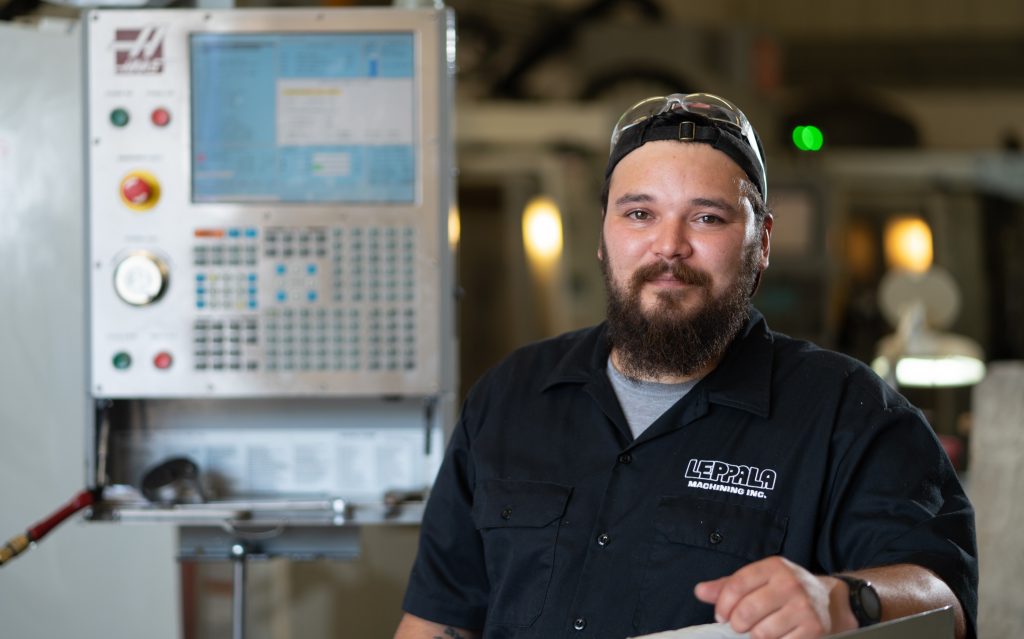
Photo by Alex Garcia
By Deborah Shelton for MxD
Jesse Navarro Jr.’s career once was a series of low-wage manufacturing jobs, manning assembly lines and performing tasks such as bottling soap and detergent.
“I was sitting there putting stuff in a box and I knew that I was capable of more than that,” said Navarro, 28. “I just never had a clear path on how to get there.”
He’d gone straight to work after high school, his plan to enlist in the military ended by an injury. He also enrolled in community college but dropped out when he couldn’t afford the classes. “I didn’t know what I was going to do,” he said.
Several years ago, he joined Leppala Machining Inc., a small company in Beach Park, Ill., that manufactures parts for a wide range of equipment, from medical to construction.
When the owner, Duane Leppala, heard about a digital manufacturing apprenticeship program at the College of Lake County (CLC) in Grayslake, Ill., it seemed like the perfect opportunity for someone like Navarro.
Not only would he receive a technical education and acquire valuable new skills, he would serve his apprenticeship with his current employer. Navarro saw it as a plus that he didn’t have to leave and start over somewhere else. The company, meanwhile, was able to keep a valued employee and benefit from what he learned.
The program also opened Navarro’s eyes to new opportunities.
“When I was in high school, they had a woodworking class and stuff like that,” Navarro said, “but I didn’t hear about careers in manufacturing.”
The community college runs three manufacturing apprenticeship programs: Computer Numerical Control (CNC), Automation, Robotics and Mechatronics (ARM) and HVAC.
CNC and ARM were expanded in March 2021 after CLC received a $244,000 grant from MxD as part of its effort to equip the manufacturing workforce with the knowledge and expertise needed to run the factories of the future. The programs, launched in August 2020, combine classroom instruction with on-the-job training guided by a mentor. The MxD grant pays for the training and provides a stipend to apprentices every semester to cover expenses such as tools and work clothes.
Some of the apprentices would not be able to participate without the financial support from MxD, said Dan Ortego, apprenticeship manager at CLC. By fall, 12 of the 50 apprentices will be enrolled in the two expanded programs, he said.
MxD received funding from Siemens Foundation for the grant, which allowed CLC to add cybersecurity content to its existing manufacturing curriculum.
“Our goal is to teach students in CNC and ARM to be more aware of and be better-equipped to handle the challenges of cybersecurity in manufacturing,” Ortego said.
Some of Navarro’s classes include CNC operations, CNC programming, and blueprint reading. In addition to learning how to operate advanced manufacturing equipment, his technical education will lead to an associate’s degree in applied science.
After completing the nine-semester CLC program, students receive certification through the National Institute for Metalworking Skills, or NIMS, for a Level One CNC Operator and/or Level One CNC Operator/Setup Technician. The certifications and degree prepare students to program FANUC and HAAS CNC controlled lathes, milling machines, and wire EDM.
“I never thought I’d be doing anything like this,” Navarro said. “I just never knew it existed.”
Navarro, who is married and has a 14-year-old stepdaughter and 2-year-old daughter, works full-time during the day at Leppala and attends classes and labs at night. He also takes the program’s online courses. The technical education he receives is reinforced by the on-the-job training.
Ortego said the apprenticeship is a win-win for everybody. Many small companies like Leppala Machining could not afford to sponsor an apprentice or pay for their post-high school education, he said.
It can be more economical to take on an employee as an apprentice than to hire new workers, Ortego added. Employers know what they’re getting plus apprenticeship programs are a way to nurture homegrown talent, Ortego said. Apprentices feel like they are a valued part of the company and can picture themselves moving up within the organization. In some cases, trainees use their associate degree as a stepping stone to get a bachelor’s degree.
“It’s a game changer for them,” Ortego said. “Their technical education aligns with the hands-on experience that they’re getting. It provides them an opportunity to ‘learn and earn’ a career as they go forward.”
And he adds: “We wouldn’t be able to do it without MxD support.”
The MxD grant also helped establish an apprenticeship bootcamp for high school graduates, returning adult students and current workers from Waukegan, North Chicago, Zion, Fox Lake and Round Lake in the far north suburbs of Chicago.
“We are developing a talent pipeline from high schools and doing everything we can to increase awareness in underserved communities of careers in manufacturing, including cybersecurity,” Ortego said.
Navarro had never seen a CNC machine before working at Leppala Machining. “I didn’t even know this type of work existed,” he said. “I wish I would have learned about that in high school. I would have started a lot earlier.”
He’s intrigued by the work, which motivates him to know even more.
“I enjoy it,” he said. “I don’t wake up thinking, ‘Oh, man, I have to go to work!’ I actually don’t mind being there. I like the challenge of it—the challenge of learning new things, learning stuff you wouldn’t think you’d be able to learn.”
How will this program impact Navarro’s work life moving forward?
“Basically, a lot,” he said. “It’ll give me more opportunities. Companies want to hire people who have training and experience.”
Learn more about the College of Lake County’s manufacturing apprenticeship programs and fill out a student interest form.
